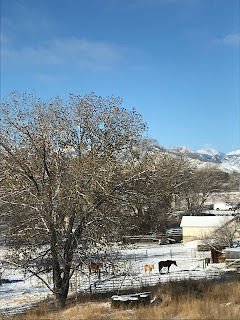If you want to research the future, research the hell out of the past. That's my suggestion.
Listen, theres an old saying "Those who do not study history are doomed to repeat it." I'm paraphrasing because, well, deadlines.
I have been praised a few times for my world-building skills. I am always flattered when that happens, because I'm not really sure if I have any particular skills beyond looking at the past and connecting dots.
Let's look at the sociological ramifications of geography as an example. Let's say you have a kingdom that lives at the edge of the sea. Well, first off, history tells us they're going to need a source of fresh water. It also says that, statistically speaking, they're likely to have a good amount of fish in their diet. depending on whether or not there are ship building skills among the set of local talents, they're probably going to be traveling to other countries and either conquering them or trading with them. Those are the basics, as it were. Now you get to expand on that. What sort of sea life exists in this land/world? If we look back on history, that's going to make a difference. If there are no fish in the waters, they need a different source of food. Might be they've long since learned to live on sea plants, such as seaweed and kelp. Might also be that they've gone inland for their sources of food.
No ships! They have surfboards. Okay..a little tricky, but the odds are good the society would evolve and adapt to take advantage of these miracles o science in an effort to travel to other lands. They might not always survive, but they'd make the best of it.
The only local fish are gigantic sea monsters that ravage the towns along the shore constantly. Either they're moving away (not likely) or they're going to learn how to combat/control these beasts. if they figure out how to "break" the sea monsters and then how to ride on them, we're got another form of transport AND a new weapon in the fight against other countries. MAYBE they were just going to trade with those countries but when the monsters that are only in their area are first seen, they will quickly realize that trading has less advantages than simply taking. "But Jim, why?"
Because history tells us that most often humans believe in conquest over negotiation, especially in primitive cultures. Mind you, as author you are god of your new world and you can change that any way you'd like.
Okay, so now we have a culture that a) owns the seas, B) is in the mood to conquer, and c) really feels pretty good about being in charge of the world at large, or at least the areas around the sea. What happens when they try to go inland?
They try the rivers, but those sea monsters they ride here and there aren't very good at traveling up through the shallow spots and they haven't evolved legs yet, so that's an issue.
Now, at the same time, there's a group of people in the highlands who've learned to ride and domesticate massive bearlike things that we'll just call bears for this note. they, too, have mastered riding great beasts and have taken advantage of this to basically rule over everything around them.
They do NOT have a problem riding into the lowlands and taking over as much as they can and the poor slobs in the lowlands are only prepared for monsters from the sea, so there's a new challenge here. Bears versus sea monsters. Both sides have distinct advantages.
Historically speaking we can find analogs for both of these scenarios. Those with ships versus those without. Heck we can take a look at large land dwelling creatures like elephants, and the people who figured out how to make them weapons of war, and see another possibility. Bears the size of elephants, with big damn claws, mean teeth and thick fur that can deflect many spears, etc. Suddenly this fight has a different outcome.
We have a long history in this world and it covers many, many diverse cultures. Any of that history can be used as an example of what MIGHT happen and a great deal of that history has barely been examined.
Want to know how gods work? Look at your history books.
Want to understand the concept of the devil or a trickster? Same answer.
Need to see how a siege mentality can change a battle? Once again, look at the history of this world and combine it with the culture you are creating and the world becomes your playground.
The same thing, by the way, works for science fiction.
I'm working on an outline right now that involves world ships, colonization, territorial rights and, of course, an alien OTHER that disagrees. Should be a proper nightmare by the time I'm finished. But I started out by looking at colonization and the history of violence that it entails.
Sorry I missed you the last few weeks, folks. Turns out that storms and airports seldom work together and that I can't post as well without the internet. But I'll try to do better.
On an unrelated note: If you are a fan of horror and you love horror anthologies. Christopher Golden. yours truly and Haverhill House Publications are all working together to bring about a truly open anthology. No places held for big names and bling submissions. We know nothing of 2who wrote what until the stpries are accepted. But most publishers don't much care for that idea, so in order to make it happen we're having to do a Gofundme. If you are interested please look here:
https://www.gofundme.com/the-twisted-book-of-shadows?utm_content=buffer3c233&utm_medium=social&utm_source=twitter.com&utm_campaign=buffer If not, fully understood but we want to make this happen.
Also, coming soon to bookstores, here's the cover for FALLEN GODS, the second book in my TIDES OF WAR series.










